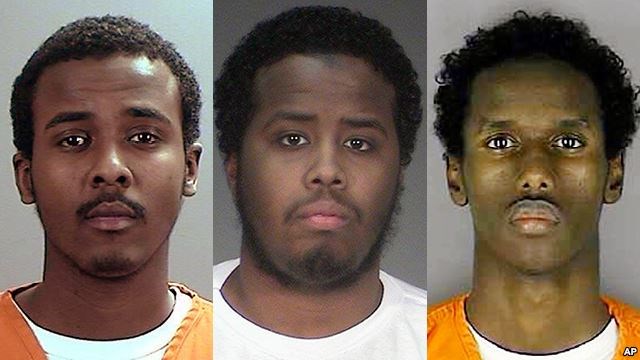
Sunday June 5, 2016
By Harun Maruf
The top law enforcement officer in Minnesota says the recent conviction of three Somali American men on terrorism charges should be a "wakeup call" for some members of the local ethnic Somali community whom he says continue to live in "denial" that community members could be targeted by Islamic State (IS) recruiters.
U.S. Attorney Andrew Luger was speaking after a court in Minnesota found three men guilty of conspiracy to provide material support to the IS group and conspiracy to commit murder abroad.
"Because these defendants decided to go to trail we were able to shine a bright light on the problem of terror recruiting in our own backyard, and we must all do what we can to stop it," Luger told the reporters in the Minnesota courthouse after the verdict was read.
But Lugar indicated the government is not receiving all of the support it needs from the community.
"One obstacle to preventing terror recruiting in Minnesota is the persistence of ISIL, they are reaching out with a powerful but false message but there is a second obstacle to stopping this recruiting – denial," he said. "Some continue to deny that terror recruiting exists. This is no time for people to stick their head in the sand," he warned.
Complaints of Entrapment
The group of men prosecuted for ties to IS were tracked by the FBI for months as it built up a case against them. However, some community leaders and the parents of the three defendants complained that the men were set up, that the FBI's paid informant lied about them, or that the trial they received was unfair because of the all-white jury. One of the defendants during the trial said he and his friends were merely boasting when talking about their plans.
After the verdict was delivered, Ayan Farah, mother of Mohamed Farah, told VOA Somali that she was in disbelief that her son could be guilty.
"My son is 22 years of age, born here. They are saying he committed murder against people we have not seen. In this country, if you kill someone you have got to have proof. This is a government plot. They bought the jury."
U.S. Attorney Luger denied that the men were entrapped or were not serious about joining IS, saying they knew what they were doing.
"The evidence of this case makes clear that Omar, Daud and Farah were not wayward kids who were just caught up in a fantasy. The evidence made clear that they were not misled by a friend or tricked into becoming terrorists," he said.
"Rather they made a deeply personal and deliberate decision back in 2014. They wanted to fight for a brutal terrorist organization, kill innocent people and destroy their own families in the process. They made that decision on their own long before a friend started taping their extraordinary planning sessions."
Economic, Social Struggles Fuel Recruitment
Although Luger called the trial a "wakeup call" for the community, some local leaders say there is already widespread recognition of the problem.
Abdirizak Bihi, a community activist who is also an uncle to a Somali-American man who died in Somalia after joining Al-Shabab in 2008 said there was a time when some community leaders were in denial but not anymore.
"In the past some recognizable faces would go on television stations and criticize who ever says something about the [recruitment] problem," he said.
"But that time has gone. The Somali-American community realize the problem - there are few individuals who, day and night argue that it does not exist, that it's misinformation – but the community lacks someone to help them with the tools that would prevent their boys from being vulnerable to recruitment - unemployment, social issues, education, sports and health."
He said he believes that no parent wants to see their child behind bars or go to another country to kill some people.
"The community is united that the kids are in danger not because of ISIL and AL-Shabab but because 60% of the Somali families live below the poverty line, unemployment is 40%. There are social challenges. We have to look at these issues in order to deal with, not only recruitment but also those who are in the jail."
On the part of community leaders, he said he would urge them to, "fight against unemployment, discrimination but we have to tell the truth."

